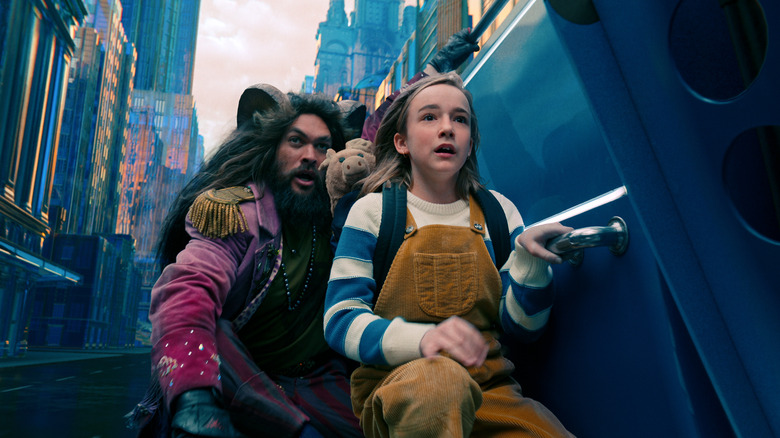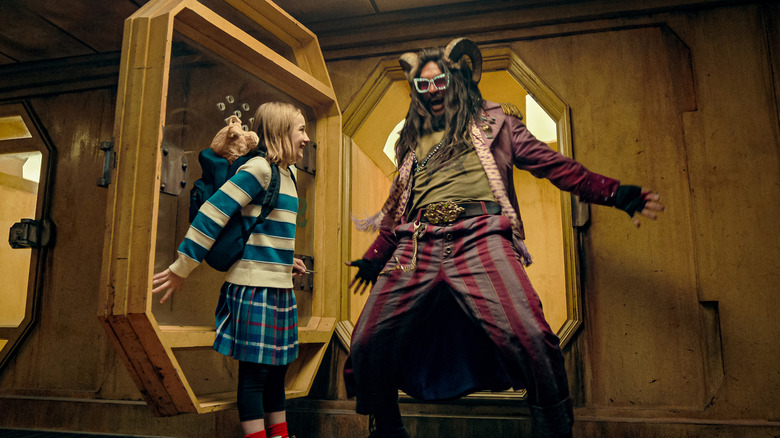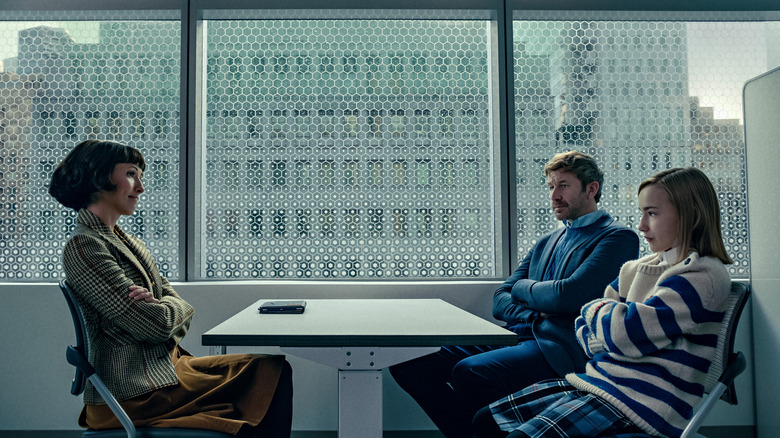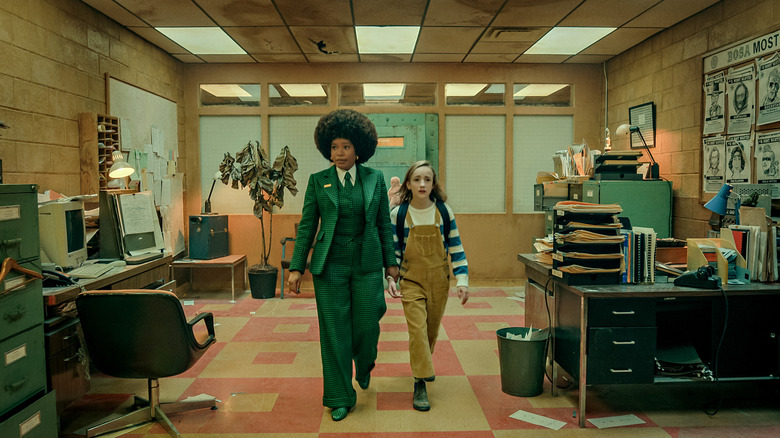Slumberland Review: You're Better Off In Your Own Dream World
The state of live-action family movies right now is dire. Outside of Paul King's masterful "Paddington" duology, you can hardly find great films aimed at children and families that are not animated. I posed the question to some of the other /Film writers about what they thought the best live-action family films were from the last decade, and I got answers like "Dora and the Lost City of Gold" and "Finding 'Ohana." After that, the answers kind of dried up, and the ones they gave weren't exactly full-throated endorsements. I like "Dora" quite a bit, but I wouldn't call it a great film. The best response given was probably "Shazam!," although the superhero nature of that story somewhat sets it apart.
Live-action family films used to be a cornerstone of cinema, particularly involving adventure stories and fantasy worlds. Go all the way back to "The Wizard of Oz" to see that, or look to the 1980s to see a boom of it with "The NeverEnding Story," "The Goonies," "Labyrinth," and more. These films have become generational classics and continue to be passed down. Today, almost every family film made that will be seen by the next generation is animated. I love animation, but it can't be the only way children can experience wonder, imagination, and an entertaining tale.
Unfortunately, Francis Lawrence's "Slumberland" will not provide any help changing the narrative in any way. This adaptation of the classic comic strip "Little Nemo in Slumberland" may throw a ton of money at the screen, but access to resources doesn't necessarily mean they will be utilized to create something that will transport a child to a whole new world. This trek through a dreamscape not only saps away the limitless imagination being asleep can provide, but it undercuts any semblance of emotional attachment by presenting its thematic ideas in as boring a way as the titular land of slumber.
Mismatched buddies that never gel
The Nemo at the center of "Slumberland" is not the Nemo we know from the original comics. That child has grown up to be Kyle Chandler, a widower who manages a lighthouse and cares for his daughter Nemo (Marlow Barkley). Every night at bedtime, Nemo is told tales of her father going on outlaw adventures with his partner Flip. The two have essentially isolated themselves on this little island after the death of Chandler's wife, and all Nemo wants to do is be like her father. One day, a major storm rolls in, and in trying to save some of the boats out at sea, her father is lost at sea, presumed dead. Bereft, Nemo is sent to live with her estranged, doorknob salesman uncle (Chris O'Dowd) and move to the city.
As a means of escape, Nemo finds herself in Slumberland one night and meets her father's old companion Flip, played by ram-horned Jason Momoa. She thinks he will be able to lead her to her father, and Flip knows Nemo has a map that leads to a treasure that grants wishes. The two decide to work together and go on an adventure, not unlike the one her father did.
The thrust of any buddy adventure film lies on the buddies at the center of it. Nemo and Flip are no match made in heaven. In the creation of Marlow Barkley's Nemo, the filmmakers didn't want her to be an overly precocious kid who talks too much like an adult, and instead, they basically settled on nothing. She's capable but lifeless. When given rare opportunities to indulge in some goofiness, they come out of nowhere, giving off the vibe of being leftovers from a previous iteration of the screenplay. Momoa, on the other hand, is doing entirely too much. His Flip comes across as a kid-friendly Jack Sparrow by way of Beetlejuice but without the charm, humor, or true edge those characters provide. It's all affectation, including an appliance of fake, gnarled teeth that he often struggles to speak through. So, when one character is doing nothing and the other is doing everything, the bond they form feels utterly hollow and inauthentic, not making you all that interested in their journey.
An intermittent adventure
The name "Slumberland" implies that we will be entering this extraordinary dreamscape of the wildly inventive, unusual, and maybe even a little surreal. Francis Lawrence, the director behind three "The Hunger Games" movies and "Red Sparrow," has never been one for wonder and awe, depicting the various dreams in as flat and unremarkable way as possible. You can feel the confines of the green screens surrounding our two main characters closing in on them. Even when they are meant to be an ever-expansive, glistening city, it feels like they could step three feet to the side and hit a blue wall. Two people standing atop a snowy mountain should have some atmosphere, like wind, visible breath ... something.
It would be wonderful if Slumberland was a visually interesting place, but even if it was, the structure of the story would still constantly undercut the pacing of the adventure. This whole tale does not take place over the course of one night while she is asleep. Nemo is constantly waking up and falling back asleep. This way we can spend some more time in her new boring life with her boring uncle, with Chris O'Dowd attempting an American accent that sounds like human bulb horn. But whenever Nemo goes back to sleep, her dream just picks up where it left off, which isn't how dreams work at all.
The movie implies that everyone dreams exactly the same thing every night. We see this not just with Nemo but with all the other people's dreams who she and Flip enter to avoid the encroaching "nightmare," rendered as a big smoke monster not unlike Parallax in the "Green Lantern" movie, and Agent Green (Weruche Opia), who is on the hunt for the thieving Flip. One guy's dream is literally looking at himself in the mirror of a public bathroom. He apparently does this every single day. So, the adventure itself isn't all that thrilling, and it can't even get off the ground for enough time before we have to go back to the real world every 15 minutes.
Dream a little bigger
The quest to find the next great live-action family film of the modern era will have to continue, because "Slumberland" is not the hidden treasure we have been looking for. I so wanted kids and families to be engulfed by an enchanting world of fantastical possibilities. To find that with the Nemo story, they will have to go back to the animated Japanese film "Little Nemo: Adventures in Slumberland" from 1989, but as I said at the beginning, I want youngsters to see that well-crafted, thoughtful, imaginative movies starring real people are out there for them, but "Slumberland" is more concerned with being palatable than it is with being exciting. No one ever captured the hearts and minds of children without taking some big swings. Francis Lawrence doesn't make incompetent movies, but his work rarely feels inspired. "Slumberland" is no different. Uninspired. And when your film is about dreams, uninspired is the last thing you want to be.
/Film rating: 2.5 out of 10



